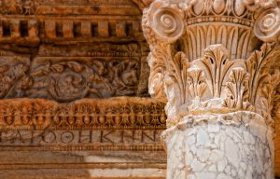The Rapture of the Church, Part 3
Corinthians and the rapture
The church which Paul (and later Apollos) established in Corinth had a special problem with the doctrine of bodily resurrection. Like all Greeks, they rejected this concept because they wanted to be free at last from all physical limitations in the afterlife. That is why we read of the Athenian philosophers: “When they heard [from Paul at the Areopagus] of the resurrection of the dead, some mocked” (NKJV, Acts 17:32).
So Paul, as the apostle to the Gentiles (cf. Gal. 2:7-9), devoted a large section of his first letter to the Corinthians to the nature and reality of Christ’s resurrection and the resurrection of all believers (1 Cor. 15:3-56).
But the climax of his entire discussion is the rapture of the church. “Behold, I tell you a mystery [Greek: mysterion—something previously unknown but now revealed]: We shall not all sleep [die], but we shall all be changed—in a moment, in the twinkling of an eye, at the last trumpet. For the trumpet will sound, and the dead will be raised incorruptible, and we shall be changed” (1 Cor. 15:51-52).
Paul’s deep desire
It is important to note that Paul included himself among those looking for this miraculous, instantaneous, spectacular change: “we shall be changed!” And what kind of a change will this be? “This mortal [body] must put on immortality [i.e., become incapable of dying]” (1 Cor. 15:53).
Even the most victorious Christian today would have to agree with Paul that “we who are in this tent [mortal body] groan, being burdened, not because we want to be unclothed [dead], but further clothed [glorified], that mortality may be swallowed up by life. Now He who has prepared us for this very thing is God, who also has given us the Spirit as a guarantee [down payment]” (2 Cor. 5:4-5).
It was the apostle Paul who stated that dead Christians are in a “far better” state than living Christians: “For to me, to live is Christ, and to die is gain. But if I live on in the flesh, this will mean fruit from my labor; yet what I shall choose I cannot tell. For I am hard-pressed between the two, having a desire to depart and be with Christ, which is far better” (Phil. 1:21-23). It will not be a loss, but a “gain.”
It will be “far better” because, for one thing, we will be sinless for the first time in our personal existence. But Paul did not want mere sinlessness. He wanted glorification!
“For we know that the whole creation groans and labors with birth pangs together until now. Not only that, but we also who have the firstfruits of the Spirit (i.e., born again Christians), even we ourselves groan within ourselves, eagerly waiting for the adoption, the redemption of our body” (Rom. 8:22-23).
And so the apostle Paul, having experienced regeneration—and by now nearly 2,000 years of sinlessness, is still awaiting resurrection and glorification—the redemption of the body.
We are awaiting that too, but with this additional blessed hope: glorification without dying by means of the rapture!
John C. Whitcomb Bio
Dr. John C. Whitcomb is heard weekly on Encounter God’s Truth, a radio and Internet broadcast outreach of Whitcomb Ministries, Inc. He has been a professor of Old Testament and theology for 60 years and is widely recognized as a leading biblical scholar. The book he coauthored with the late Dr. Henry Morris in 1961, The Genesis Flood, has been credited as one of the major catalysts for the modern biblical creationism movement. Dr. Whitcomb’s broadcasts, sermons, lectures and writings are available at SermonAudio. To receive the very latest on his ministry, see Facebook.
- 5 views
Solo Christo, Soli Deo Gloria, Sola Fide, Sola Gratia, Sola Scriptura http://healtheland.wordpress.com
Views expressed are always my own and not my employer's, my church's, my family's, my neighbors', or my pets'. The house plants have authorized me to speak for them, however, and they always agree with me.
 Read
Read 



Discussion